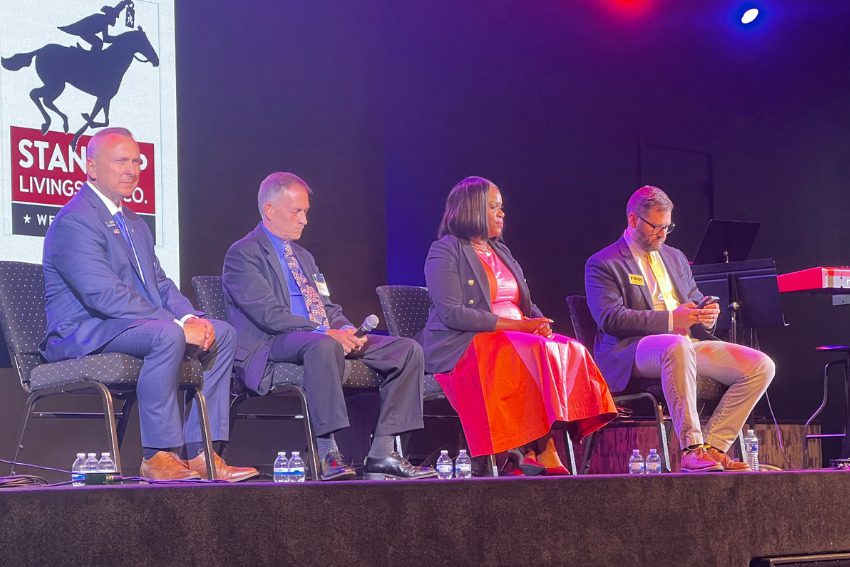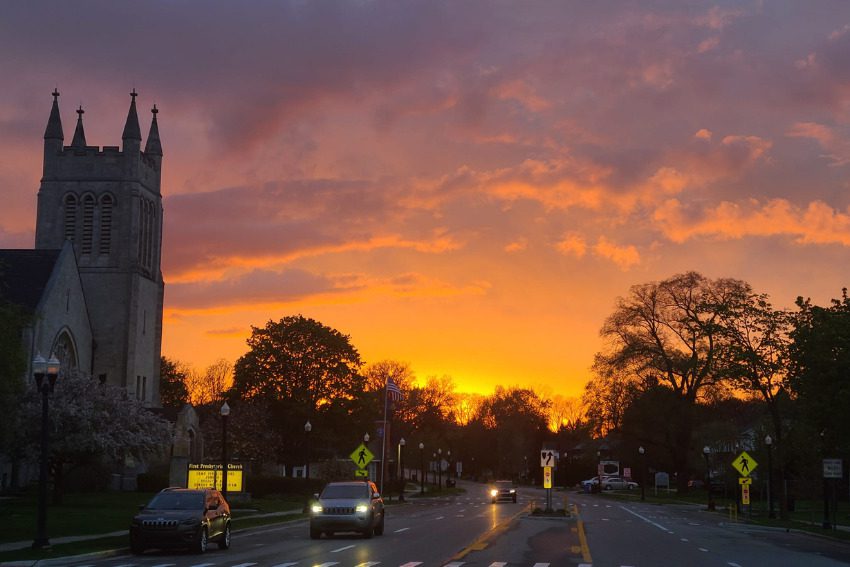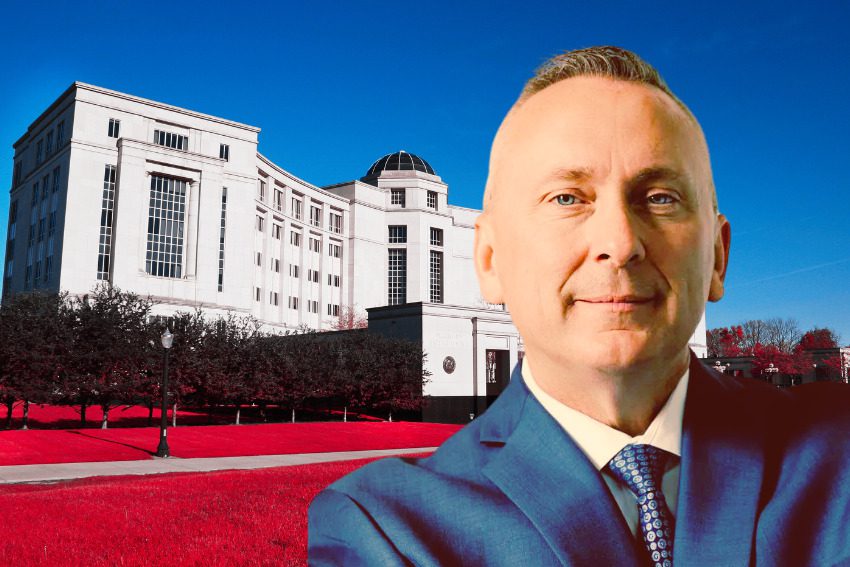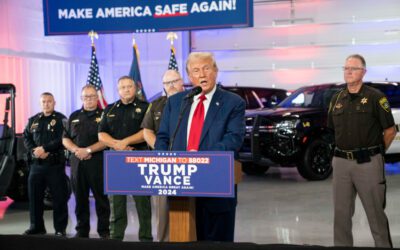
Republican Michigan Supreme Court candidates participate in a forum at a church in Howell on Thursday, Aug. 8, 2024. (Kyle Kaminski/The 'Gander Newsroom)
The Republican candidates for the state Supreme Court are standing against Michigan’s women and workers—and the ‘woke rogue liberal bench’ that has sided with them.
MICHIGAN—The Republican candidates vying for a seat on the Michigan Supreme Court this year are voicing support for a far-right, “biblical” vision for the future which could peel back abortion access, workers’ rights, protections for the LGBTQ community, and a whole lot more.
Four of the five candidates who are seeking the Republican Party’s nomination to run for two seats on the Court in November spent about two hours inside a church in rural Livingston County on Thursday evening to share their views about a variety of issues facing the state.
The event, hosted by two right-wing groups that have pushed election-related conspiracy theories, was billed as “the Great Debate,” but turned out to be more of an open candidate forum where four Republicans—Mark Boonstra, Andrew Fink, Alexandria Taylor, and Patrick William O’Grady—were allotted time to answer a series of questions from three moderators.
Two state Supreme Court candidates will be nominated by the Michigan Republican Party later this month, and will then face off in the November general election for two seats on the Court against Democratic-backed candidates Kyra Harris Bolden and Kimberly Ann Thomas.
But rather than keep their personal opinions closely guarded to maintain a sense of impartiality ahead of Election Day, the Republican candidates took turns talking about election conspiracies, US Supreme Court Justice Clarence Thomas, and bigoted, anti-LGBTQ rhetoric, as well as making clear how they would decide cases tied to workers and womens’ rights in Michigan.
Here are some takeaways:
1. It’s clear where the candidates stand on abortion.
When asked about their various judicial philosophies, each of the four candidates described either a “constitutionalist,” “originalist,” “textualist,” or “constitutional conservative” approach.
That’s the same mentality that guided the majority on the US Supreme Court that overturned Roe v. Wade and peeled back the constitutional right to abortion for millions of women.
Because the word “abortion” isn’t literally included in the text of the Constitution, then reproductive health care cannot be considered a “fundamental constitutional right,” Justice Samuel Alito wrote in writing for the majority in Dobbs v. Jackson Women’s Health Organization.
The Michigan Supreme Court has the power to interpret state laws and how they apply to Michiganders. As lawsuits dealing with abortion in Michigan make their way through the state’s legal system, questions of reproductive freedom may find their way in front of the Court.
During the debate, Boonstra also described himself as “pro-life” in response to a question about whether he could separate his personal views from his ability to deal with controversial cases.
“There is one area that, I guess, is sort of out there, potentially, and I don’t know what cases might come before us, or how I would rule, or what the issues would be, but I’m pro-life” he said. “But we now have a constitutional amendment the voters voted in, that puts a right to abortion in our Constitution. So what’s going to happen when cases come up that put that issue at the forefront? … I will deal with it as best I can. I will follow my conscience to the best I can, and maybe there’ll be some creative lawyering that, again, will find a way for me to follow both.”
2. Michigan workers weren’t a priority.
Each of the four candidates voiced opposition to a recent Michigan Supreme Court decision that will reinstate major changes to the state’s minimum wage and paid sick leave laws.
The decision requires the state Treasurer to implement a new, higher state minimum wage schedule that gradually eliminates a lower minimum wage for tipped workers in restaurants and mandates most employers to provide workers with at least 72 hours of paid time off per year.
That means if Republicans had made decisions for the Court this year, tens of thousands of Michigan workers who earn minimum wage, as well as restaurant staff who rely on tips, would’ve lost out on a series of pay raises that begin next year and will continue through 2028.
Taylor said the decision for higher wages was “judicial overreach” that “infringes” on businesses.
“So many small businesses, the restaurant association, so many of them will be desecrated by that opinion,” Taylor said. “That decision alarms me because … you are going to desecrate businesses, kill the middle class, and you’re going to eliminate so many jobs.”
Boonstra and O’Grady also named the recent minimum wage decision when asked by the moderators to name a recent Michigan Supreme Court decision with which they disagreed.
Fink, for his part, said that he disagreed with a separate state Supreme Court decision that upheld stricter state permitting conditions for factory farms, namely to prevent air pollution. Environmentalists have celebrated the ruling, but Fink contended that it provided too much regulatory authority to the Michigan Department of Environment, Great Lakes, and Energy.
3. LGBTQ rights came under attack.
Taylor said she would bring a “biblical worldview” to the Michigan Supreme Court, which includes a steadfast belief that transgender people are an “abomination” under God.
“God determines your sex. You don’t determine that,” Taylor said.
Taylor also said she views her campaign as a “battle of good and evil,” which is why she hired a spiritual leader who regularly delivers “prophetic forecasts” as her chief of staff, she explained.
Taylor also applauded when the church’s pastor, who is also running for a seat on a local library board, made an introductory remark about “removing LBGTQ” from Michigan’s public libraries.
“Some of my proudest endorsements are from spiritual leaders because most of us understand that this is a battle of good and evil,” Taylor told the crowd on Thursday. “And so we could talk about politics all day, but I want people to know we’re fighting for the soul of this nation.”
Boonstra, who describes himself as a “patriot,” also bragged about an opinion he authored in 2022 in which he refused to refer to a defendant in a criminal sexual assault case as a transgender female using their appropriate gender nonbinary pronouns “they” and “them.”
During the debate, Boonstra told a fictional account of the case, instead describing “a defendant who wanted us to call him ‘they’ because he identified as an 8-year-old girl and a cat.”
“I don’t really care how you identify. Don’t involve us in it,” Boonstra added. “We shouldn’t be writing our opinions to conform to how everybody wants to be identified in any particular case.”
4. Forget the separation of church and state.
God also played an outsized role in last week’s debate.
Taylor spoke about her “biblical worldview,” and how “our founding fathers were men of God.” Boonstra told the crowd about a book he wrote that outlined the problems in “Today’s Godless America.” And O’Grady talked at length about “forming this state pursuant to almighty God.”
“We are very fortunate that we do have a country that was founded on Judeo-Christian principles of our founding fathers. We also have the same thing for our state,” O’Grady said. “If you read the preamble to the state Constitution, they’re basically forming this state pursuant to Almighty God. It’s in the preamble. It’s right there. That’s how they open it up. A group of people saying, ‘we’re getting ready to create this state, and we’re doing it for almighty God.’”
He added: “When you have a Christian worldview as an example, your conscience is in line with those documents. It’s really only when you don’t have that or when you’re trying to stretch them, bend them, change them, create something that’s not there, it’s acrimony in your soul.”
5. Election-related conspiracy theories abound.
Taylor faced state sanctions because of a lawsuit she filed in 2022 that claimed, without evidence, that there was wrongdoing in the 2020 presidential election. And over the last two years, she doesn’t appear to have backed down from those election-related conspiracy theories.
“I know my rights and you cannot silence me,” Taylor told the crowd. “In the current system that we’re in, they’re stealing elections. That’s the reality. It’s like you really can’t trust our election system when the people that are being voted in sometimes are not the ones who truly won.”
Boonstra also bragged about an endorsement from ex-President Donald Trump and how he previously “stood up” against Secretary of State Jocelyn Benson’s office in a 2020 election case that dealt with ballots that were postmarked before (but received after) Election Day.
O’Grady didn’t directly address his philosophy on elections or how he would handle election-related cases, except to note plans to stick to a strict reading of the US Constitution.
“These lanes have been created by our founding fathers,” O’Grady said. “Let’s stay in ‘em.”
It’s worth noting: Fink didn’t mention any particular election conspiracies last week, but has a long record of casting doubt on the 2020 presidential election results. Matt DePerno, who was the only Republican candidate absent from the debate, is also a prominent election denier.
6. Recent gun reforms faced opposition.
Taylor told the crowd that their Second Amendment rights are under siege by the state Legislature, criticizing a series of bills that were passed last year to promote safe gun storage, require universal background checks, and enact extreme risk protection orders to temporarily keep firearms out of the hands of those deemed by a judge to be a risk to themselves or others.
Gov. Gretchen Whitmer first proposed those bills last January before a deadly shooting at Michigan State University in February ramped up pressure for lawmakers to take quick action.
Taylor, however, described one of the laws as “one of the most extreme red flag laws in the country.”
“And it came about after the MSU shooting because the Democrats will never let any tragedy go away. So, they’ll use that,” Taylor said. “And I, as an attorney, to me, it’s unconstitutional to take someone’s guns and then make them prove to the court why they’re not a danger.”
Boonstra also went out of his way to highlight his support of the Second Amendment as “very important,” suggesting he might be a vote against future decisions regarding gun laws.
“With the things we’re seeing from our government today, you see why our founding fathers thought it was important we have a Second Amendment because you might need it against your own government,” Boonstra said. “Hopefully not. But they understood that was a possibility.”
7. Everyone loves Clarence Thomas.
Each candidate was asked to name a Supreme Court justice they admired, and each of them named US Supreme Court Justice Clarence Thomas, who, in addition to facing a corruption scandal, generally opposes constitutional protections for abortion and LGBTQ rights.
“He’s an incredible man,” O’Grady said.
“With Clarence Thomas, it’s the way that he has stood up in the face of the weaponization and so much adversity, it’s really encouraging to me,” Taylor said. “He, to me, is a pillar of someone who has stood against that weaponization and has now cowered to the left woke agenda.”
“Both his life story and the fact that his mission as a justice is to write an accurate constitutional history of the United States, make me say Justice [Clarence] Thomas, every time,” Fink added.
READ MORE: Why you should care about this year’s Michigan Supreme Court election
For the latest Michigan news, follow The ‘Gander on Twitter.
Follow Political Correspondent Kyle Kaminski here.
Support Our Cause
Thank you for taking the time to read our work. Before you go, we hope you'll consider supporting our values-driven journalism, which has always strived to make clear what's really at stake for Michiganders and our future.
Since day one, our goal here at The 'Gander has always been to empower people across the state with fact-based news and information. We believe that when people are armed with knowledge about what's happening in their local, state, and federal governments—including who is working on their behalf and who is actively trying to block efforts aimed at improving the daily lives of Michigan families—they will be inspired to become civically engaged.


Why people are so concerned about Trump picking RFK Jr. to lead US public health
Trump’s pick for health secretary wants to increase access to raw milk, remove fluoride from drinking water, and has said that vaccines cause autism...

Hate and harassment towards women spreads after Trump’s election
Over a 24-hour period following Trump’s election, there was a 4,600% increase in the usage of the phrase “your body, my choice” on X. The phrase has...

Protesters wave Nazi flags outside performance of ‘The Diary of Anne Frank’ in Howell
BY JON KING, MICHIGAN ADVANCE MICHIGAN—For at least the third time in recent months, white supremacists with Nazi flags protested in Livingston...

All the racist, hateful things said at Trump’s rally at Madison Square Garden
The rally bore glaring similarities to a Nazi rally held at an earlier iteration of Madison Square Garden in 1939. “My reaction is that it was a...

Meet the anti-abortion groups and conspiracy theorists backing Patrick William O’Grady for Michigan Supreme Court
Circuit Court Judge Patrick William O’Grady is running for a seat on Michigan’s most powerful court—and some of his biggest supporters may help shed...







